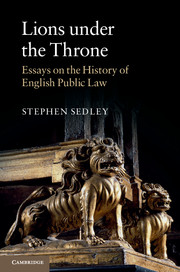Book contents
- Frontmatter
- Epigraph
- Dedication
- Contents
- Preface
- Introduction
- Part I Histories
- Part II Themes
- 6 The royal prerogative
- 7 The sovereignty of Parliament and the abuse of power
- 8 The right to be heard
- 9 The separation of powers
- 10 Public law and human rights
- 11 The state and the law
- 12 Standing and “sitting”
- 13 Law without courts: the tribunal system
- 14 The rule of law
- Index
13 - Law without courts: the tribunal system
from Part II - Themes
Published online by Cambridge University Press: 05 November 2015
- Frontmatter
- Epigraph
- Dedication
- Contents
- Preface
- Introduction
- Part I Histories
- Part II Themes
- 6 The royal prerogative
- 7 The sovereignty of Parliament and the abuse of power
- 8 The right to be heard
- 9 The separation of powers
- 10 Public law and human rights
- 11 The state and the law
- 12 Standing and “sitting”
- 13 Law without courts: the tribunal system
- 14 The rule of law
- Index
Summary
There are more ways than one of resolving legal disputes. Are tribunals second-class courts or an innovative part of the legal system?
Dispute resolution
When people talk about the law, they are almost invariably talking, consciously or unconsciously, about the law administered in law courts. Yet there is nothing – or very little – to stop people agreeing to have their disputes settled either according to some extraneous system of law or by a person or tribunal bound by no particular system of law. The courts still hold the ring: it is they who will decide whether such agreements are enforceable and whether they have been properly followed. But within that perimeter many other kinds of law and practice prevail. The tabloid indignation which greeted the Archbishop of Canterbury's acknowledgment in 2008 that it might be acceptable for people to have their disputes settled according to the shari'a law was testimony enough to the widespread unawareness that this had been possible for centuries. Every golf club or bridge club committee which is given power by the rules to adjudicate on allegations of cheating constitutes what is sometimes called an Alsatia – a place where the royal writ does not run. But even here the law holds a watching brief, for the club rules generally form a contract between the members, and into it the courts will imply (if they are not already spelt out) rules of procedural fairness.
Public law claims
These are – at least in theory – voluntary or elective jurisdictions dealing with private law relationships. Relationships between the individual and state, which are the business not of private but of public law, cannot be dealt with in this way. If a dispute arises between state and citizen, either it has to go before a court or some other means has to be found of reaching a binding decision according to what may well be an arcane body of law.
There are two immediate problems in letting such decisions go before the regular courts of law. One is sheer volume. By the beginning of the twenty-first century, almost a million disputes of this kind were being decided each year, a number which had been growing steadily for well over a century.
- Type
- Chapter
- Information
- Lions under the ThroneEssays on the History of English Public Law, pp. 247 - 268Publisher: Cambridge University PressPrint publication year: 2015

